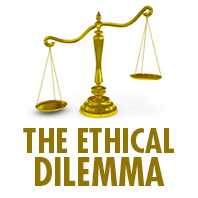The Ethical Dilemma: Should I Feel Guilty About a Big Wedding?

Experiencing an ethical dilemma? Need advice from a humanist perspective? In the spirit of the New York Times “The Ethicist” or Slate’s “Dear Prudence,” Humanist Network News is proud to introduce “The Ethical Dilemma,” an advice column by Joan Reisman-Brill.
Send your questions to The Ethical Dilemma at hnn@americanhumanist.org. All inquiries are kept confidential.
Follow-up to Silent Night: Last week you made some suggestions for the person who was suffering from incessant holiday tunes in her bed-and-breakfast. But what can we do about all that holly jolly music we hear everywhere we go from Halloween through New Year’s Day?
—Noel Where to Run, Noel Where to Hide
Dear Noel,
I suspect there is marketing data that says people buy more presents faster for more money if jingle bell jingles are playing nonstop while they shop. But short of hibernating until the season is over or wearing sound-canceling earmuffs, we are probably stuck with the rude mood music. If, however, you and many others decide to politely ask the store or restaurant or hotel managers to turn down the sound or play something else—and mention that you just can’t bear to stay there any longer with those songs blasting, so maybe you’ll just have to order online or eat at home or switch to a staycation—the commercial penchant for piping holiday music might begin to pipe down.
Even many people who love everything about Christmas hate hearing “Oh Holy Night” all day for weeks. You’re not a Grinch if you express your displeasure to people in charge of the sound system as long as you do it nicely. You may help make the season brighter for everyone.
Party Tax: I just read an editorial by an economist who advocated tightening belts in this bad economy. He specifically cited what the average wedding costs, and proposed a heavy tax on affairs that exceed this amount. I’m in the process of planning the big fancy wedding of my dreams (complete with a humanist celebrant), and I’m wondering if I should feel guilty about going above and beyond the typical budget.
—Let Them Eat Cake
Dear Cake,
I’m no economist but I wonder whether that writer really is either. Fortunately, I can’t imagine how a tax like that could possibly be enacted or enforced, since it would be economically disastrous. Think how many people’s livelihoods depend upon big affairs: caterers, waiters, cooks, butchers, bakers, candlestick makers, jewelers and craftsman, hotels and airlines, dress makers, tailors and department stores, photographers, musicians and entertainers—the list goes on and on. Big affairs create scores of jobs, many of them for small businesses who hire underemployed people eager to land a gig.
But no one should spend the rent money or the kids’ college fund on a lavish event. There’s nothing wrong with hosts on a budget asking guests to bring food or drink, or to help set the tables and serve the meal. But there is a school of thought that says it’s unethical for people to do a job themselves if they can afford to hire others to do it for them. The idea is to spread the wealth around by providing opportunities for people to make some bucks, so that they in turn have something to spend on others.
If it would make you feel better, you could suggest that your guests make donations to your—or their—favorite charities in lieu of gifts, but that should remain an option, not an edict. Many people enjoy picking out special gifts, and you are entitled to enjoy receiving them if that’s what you prefer. Keep in mind all the people who will benefit from your affair—including all the guests who will get to share your special day—and have a wonderful time without the slightest guilt.
Joan Reisman-Brill is a writer based in New York City. She received her BA in English literature from the University of Chicago, an MA also in English lit from the University of Michigan, and an MBA in management and marketing from New York University. She has worked in public relations, marketing and myriad facets of writing and editing for nearly four decades. She has been steadily increasingly her humanist identification and activism at an accelerating rate, and while she doesn’t pretend to have all the answers, she welcomes this opportunity to tackle the questions.
